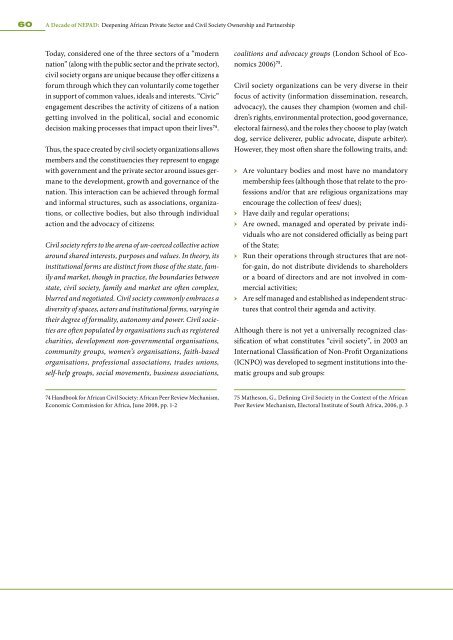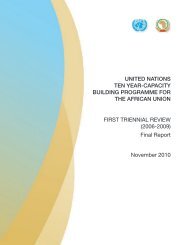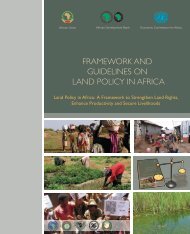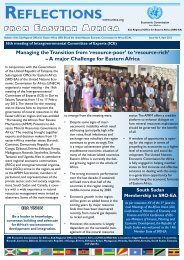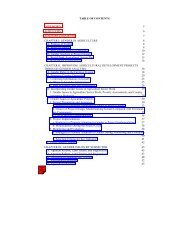A Decade of NEPAD - Economic Commission for Africa - uneca
A Decade of NEPAD - Economic Commission for Africa - uneca
A Decade of NEPAD - Economic Commission for Africa - uneca
Create successful ePaper yourself
Turn your PDF publications into a flip-book with our unique Google optimized e-Paper software.
60 A <strong>Decade</strong> <strong>of</strong> <strong>NEPAD</strong>: Deepening <strong>Africa</strong>n Private Sector and Civil Society Ownership and Partnership<br />
Today, considered one <strong>of</strong> the three sectors <strong>of</strong> a “modern<br />
nation” (along with the public sector and the private sector),<br />
civil society organs are unique because they <strong>of</strong>fer citizens a<br />
<strong>for</strong>um through which they can voluntarily come together<br />
in support <strong>of</strong> common values, ideals and interests. “Civic”<br />
engagement describes the activity <strong>of</strong> citizens <strong>of</strong> a nation<br />
getting involved in the political, social and economic<br />
decision making processes that impact upon their lives 74 .<br />
Thus, the space created by civil society organizations allows<br />
members and the constituencies they represent to engage<br />
with government and the private sector around issues germane<br />
to the development, growth and governance <strong>of</strong> the<br />
nation. This interaction can be achieved through <strong>for</strong>mal<br />
and in<strong>for</strong>mal structures, such as associations, organizations,<br />
or collective bodies, but also through individual<br />
action and the advocacy <strong>of</strong> citizens:<br />
Civil society refers to the arena <strong>of</strong> un-coerced collective action<br />
around shared interests, purposes and values. In theory, its<br />
institutional <strong>for</strong>ms are distinct from those <strong>of</strong> the state, family<br />
and market, though in practice, the boundaries between<br />
state, civil society, family and market are <strong>of</strong>ten complex,<br />
blurred and negotiated. Civil society commonly embraces a<br />
diversity <strong>of</strong> spaces, actors and institutional <strong>for</strong>ms, varying in<br />
their degree <strong>of</strong> <strong>for</strong>mality, autonomy and power. Civil societies<br />
are <strong>of</strong>ten populated by organisations such as registered<br />
charities, development non-governmental organisations,<br />
community groups, women’s organisations, faith-based<br />
organisations, pr<strong>of</strong>essional associations, trades unions,<br />
self-help groups, social movements, business associations,<br />
74 Handbook <strong>for</strong> <strong>Africa</strong>n Civil Society: <strong>Africa</strong>n Peer Review Mechanism,<br />
<strong>Economic</strong> <strong>Commission</strong> <strong>for</strong> <strong>Africa</strong>, June 2008, pp. 1-2<br />
coalitions and advocacy groups (London School <strong>of</strong> <strong>Economic</strong>s<br />
2006) 75 .<br />
Civil society organizations can be very diverse in their<br />
focus <strong>of</strong> activity (in<strong>for</strong>mation dissemination, research,<br />
advocacy), the causes they champion (women and children’s<br />
rights, environmental protection, good governance,<br />
electoral fairness), and the roles they choose to play (watch<br />
dog, service deliverer, public advocate, dispute arbiter).<br />
However, they most <strong>of</strong>ten share the following traits, and:<br />
ӹ Are voluntary bodies and most have no mandatory<br />
membership fees (although those that relate to the pr<strong>of</strong>essions<br />
and/or that are religious organizations may<br />
encourage the collection <strong>of</strong> fees/ dues);<br />
ӹ Have daily and regular operations;<br />
ӹ Are owned, managed and operated by private individuals<br />
who are not considered <strong>of</strong>ficially as being part<br />
<strong>of</strong> the State;<br />
ӹ Run their operations through structures that are not<strong>for</strong>-gain,<br />
do not distribute dividends to shareholders<br />
or a board <strong>of</strong> directors and are not involved in commercial<br />
activities;<br />
ӹ Are self managed and established as independent structures<br />
that control their agenda and activity.<br />
Although there is not yet a universally recognized classification<br />
<strong>of</strong> what constitutes “civil society”, in 2003 an<br />
International Classification <strong>of</strong> Non-Pr<strong>of</strong>it Organizations<br />
(ICNPO) was developed to segment institutions into thematic<br />
groups and sub groups:<br />
75 Matheson, G., Defining Civil Society in the Context <strong>of</strong> the <strong>Africa</strong>n<br />
Peer Review Mechanism, Electoral Institute <strong>of</strong> South <strong>Africa</strong>, 2006, p. 3


